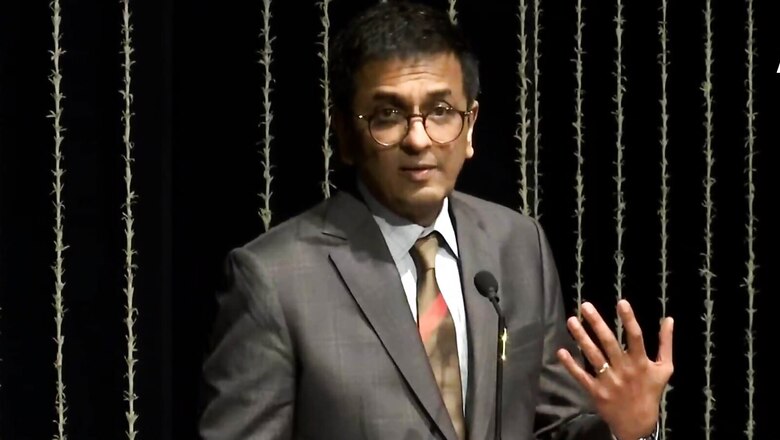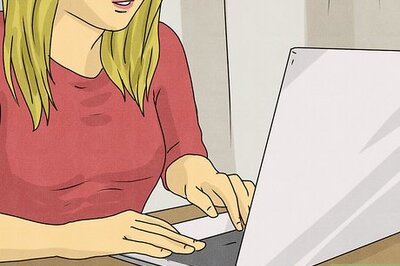
views
The truth has become a “victim” in the age of false news and with the spread of social media, Chief Justice of India D Y Chandrachud said adding that people today have short “patience and tolerance”, and are not willing to accept perspectives which are different from their own.
Addressing the American Bar Association (ABA) India Conference 2023 on ‘Law in the Age of Glocalisation: Convergence of India and the West’ on Friday, CJI Chandrachud also talked about the role of technology in the judiciary, especially during the COVID-19 pandemic, issues confronting the judicial profession and on having more women judges.
Here are Recent Top Courts Quotes of CJI Chandrachud :
▶ ‘Truth became victim of false news’: “Truth has become the victim in an age of false news. With the spread of social media, something which is said as a seed germinates into virtually a whole theory which can never be tested on the anvil of rational science,” CJI said.
▶’Indian Constitution prime example of globalisation’: Justice Chandrachud noted that in many ways, the Indian Constitution is a prime example of globalisation even before we ventured into the age of globalisation, adding that when it was drafted, its makers had possibly no idea of the lines along which humanity would evolve.
▶’For everything you do, you face a threat of being trolled’: “We did not possess notions of privacy, there was no internet. We did not live in a world which was controlled by algorithms. We certainly did not have social media,” he said.
“For every little thing that we do, and believe me, as judges we are no exception to this, for everything that you do, you face the threat of being trolled by someone who does not share your point of view,” the CJI added.
▶‘People not willing to accept perspectives different from their own’: CJI said just as humanity has expanded with the global advent of travel and technology, but people today are short on patience and tolerance, and are not willing to accept perspectives that are different from their own.
▶”And I believe that is the challenge of our age. Some of this is perhaps the product of technology itself,” he said, while also dwelling on the positives of technology.
▶Impact of Covid and use of technolgy in judiciary: Speaking about the time when COVID-19 had spread across the world, including India, the CJI said “What video-conferencing has done as a consequence of pandemic is that it has led to a decentralisation of justice. And I think this decentralisation of justice is an important paradigm in promoting greater access to justice,” he said.
‘He said the Supreme Court of India is not the apex court of Tilak Marg at New Delhi but it represents the aspirations of citizens in the smallest villages in the country.
“And what better way to reach out to our citizens than to use technology as a part of our mission to take justice to the doorsteps of citizens,” he said.
▶‘Legal profession still patriarchal, feudal, built upon kinships’: “But, apart from technology, there are vital issues which confront the profession today. Chief among them is the reform of the legal profession itself. In so many ways, our profession is still patriarchal, our profession is feudal, our profession is built upon kinships and relationships of community,” he said.
▶‘2001 terror attack a watershed moment’: Justice Chandrachud said globalisation has led to its own discontent and there are a number of reasons for this, for the meltdown which has been experienced the world over.
“One, I think the first of the origins of this lay in the terror attacks which took place in 2001. India was shaken up sporadically by these terror attacks… But 2001 was a watershed moment which brought to the global society the stark realities which India had already confronted for years and years before that,” he said.
▶ On inclusion of more women in judiciary: The CJI said he is often asked why we cannot have more women judges in the country, adding that the state of our institution today in terms of inclusion and diversity reflects the state of the profession two decades ago.
“Because the judges who come to the high courts today, say in 2023, or judges who come to the Supreme Court in 2023 reflect the state of the bar in the beginning of the millennium,” he said.
Justice Chandrachud said unless there was a level-playing field for women to enter and thrive in the legal profession between 2000 and 2023, there is no magic wand by which you will have apex court judges drawn from among women in 2023.
“So we have to create a framework, a groundwork for a more diverse and inclusive profession today if we truly have to create a future where our profession will be more inclusive and diverse,” he said.
▶‘More than 50 per cent women in district judiciary of some states’: The CJI said the statistics on recent recruitment in the district judiciary in India indicates that in many states, more than 50 per cent are women and said the cause of that is the spread of education in India.
“As education spread in India, women education has gone up and there is today a perception on the part of middle class, the growing middle class in India, that the key to prosperity of an average Indian family is to educate their daughters,” he said.
▶ On the use of the internet and technology inside courts: Speaking at a virtual inauguration ceremony of the administrative block and various e-initiatives of Calcutta High Court on Wednesday, said that judges should allow lawyers to work on their electronic gadgets inside the courtrooms.
CJI Chandrachud noted that mobile phones are now ubiquitous in society and asked judges to ensure internet facilities with adequate firewalls inside courtrooms so that it is put to genuine and authorised use.
Recalling the time when mobile phones were banned inside many courtrooms, CJI said, “and here we are today releasing a mobile application for the high court but we have to be kind on ourselves as just we have to be kind on the members of the bar and the litigants.”
▶‘Carrying discipline too far’: “Just the other day I heard not a complaint or a grievance but a little bit of a suggestion from a young junior who was working on her iPad in a courtroom in one of our premier High Courts. While working on her IPad, the usher of the court came to the young junior and said that ‘you have to switch off your iPad because this is not in accordance with the discipline of the court’. And I said that we are carrying our discipline too far,” he added.
▶‘Lawyers should be allowed to use iPads till not watching films in courtrooms’: “A young junior or a young lawyer or any lawyer for that matter working on an iPad within the precincts of the courtroom should be allowed to work on it so long as they’re not watching movies on the iPad or on their laptops. We must trust people. We must set up internet facilities within our courtrooms and of course have adequately maintained firewalls so that the facility is put to genuine and authorised use,” he said.
▶‘Adoption of technology today to meet the needs of tomorrow’: Further speaking about the use of technology by the judiciary, CJI said that his personal motto on the adoption of technology is to meet the needs of tomorrow as well.
(With inputs from agencies)
Read all the Latest India News here


















Comments
0 comment